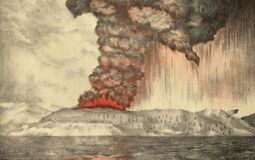Siriwang Eruption: Difference between revisions
Hierophant (talk | contribs) No edit summary |
Hierophant (talk | contribs) No edit summary |
||
| Line 1: | Line 1: | ||
{{Region_icon_Ajax}} | |||
{{WIP}}{{Infobox eruption | {{WIP}}{{Infobox eruption | ||
| name = 1353 Eruption at Siriwang | | name = 1353 Eruption at Siriwang | ||
| Line 20: | Line 21: | ||
| deaths = The entire court of Pelautama Tuminindyah Selangit and her fleet (600~) and the inhabitants of the island. (300~) | | deaths = The entire court of Pelautama Tuminindyah Selangit and her fleet (600~) and the inhabitants of the island. (300~) | ||
}} | }} | ||
The 1353 eruption of Mt. Siriwang in the Ozeros Sea began on the early morning of December 30th, 1353- with origins of a potential eruption expected to be only a few days prior- and peaked only four hours into the process, when the entirity of the island and the surrounding atoll were destroyed as it sunk into an underwater caldera. | |||
The eruption was one of the deadliest in recorded history, and it is projected to be the most destructive environmental event to occur within written history of the [[Ajax|world.]] The explosive impact of the eruption was so violent, that they were heard in communities and societies throughout the Ozeros and beyond to a projected 4,8000 kilometers(3,000 miles). At least a thousand deaths are attributed to the direct impact of the eruption, and much more connected to the aftermath events, including the acidic rain, various tsunamis and earthquakes, and the global volcanic winter that followed, with severe temperature drops felt worldwide. The sound was claimed to have been heard in countless societies across the world, with the sound wave predicted to have traveled the world over five times, according to seismological analysis. | |||
Signifigant effects of the eruption shaped much of the world in the weeks and months thereafter, including altered weather patterns, discoloration of the sky, and temporally disrupted ocean and wind currents. | |||
==Early Phase== | |||
==Climactic Phase== | |||
==Effects== | |||
==In popular culture== | |||
[[Category:Pulau Keramat]] | |||
[[Category:Ajax]] | |||
Revision as of 06:52, 30 April 2021
This article is incomplete because it is pending further input from participants, or it is a work-in-progress by one author. Please comment on this article's talk page to share your input, comments and questions. Note: To contribute to this article, you may need to seek help from the author(s) of this page. |
| 1353 Eruption at Siriwang | |
|---|---|
 A drawing estimating the early stages of the Siriwang eruption, completed in 1358. | |
| Volcano | Mt. Siriwang |
| Start date | December 30, 1353 |
| End date | December 31, 1353 |
| Type | Ultra-Plinian |
| Location | Tua Siriwang, Tahamaja Empire |
| VEI | 6 |
| Impact | large scale loss of life, destruction of the island, collapse of the Tahamaja Empire. |
| Deaths | The entire court of Pelautama Tuminindyah Selangit and her fleet (600~) and the inhabitants of the island. (300~) |
The 1353 eruption of Mt. Siriwang in the Ozeros Sea began on the early morning of December 30th, 1353- with origins of a potential eruption expected to be only a few days prior- and peaked only four hours into the process, when the entirity of the island and the surrounding atoll were destroyed as it sunk into an underwater caldera.
The eruption was one of the deadliest in recorded history, and it is projected to be the most destructive environmental event to occur within written history of the world. The explosive impact of the eruption was so violent, that they were heard in communities and societies throughout the Ozeros and beyond to a projected 4,8000 kilometers(3,000 miles). At least a thousand deaths are attributed to the direct impact of the eruption, and much more connected to the aftermath events, including the acidic rain, various tsunamis and earthquakes, and the global volcanic winter that followed, with severe temperature drops felt worldwide. The sound was claimed to have been heard in countless societies across the world, with the sound wave predicted to have traveled the world over five times, according to seismological analysis.
Signifigant effects of the eruption shaped much of the world in the weeks and months thereafter, including altered weather patterns, discoloration of the sky, and temporally disrupted ocean and wind currents.